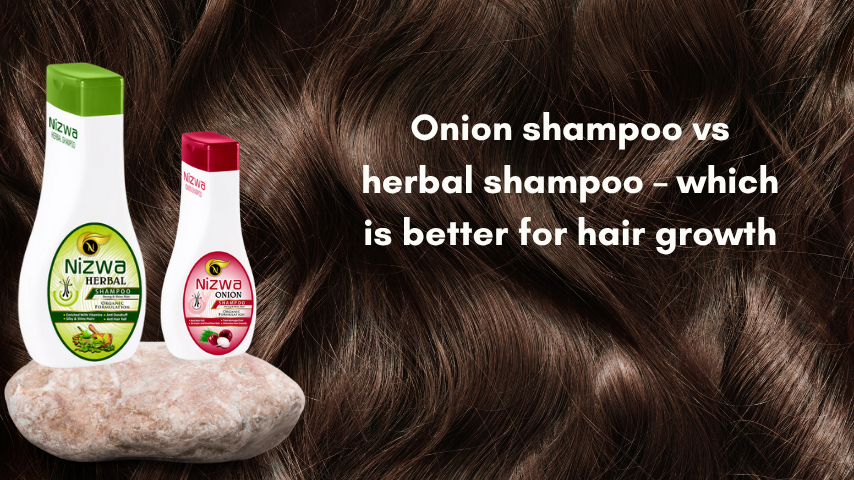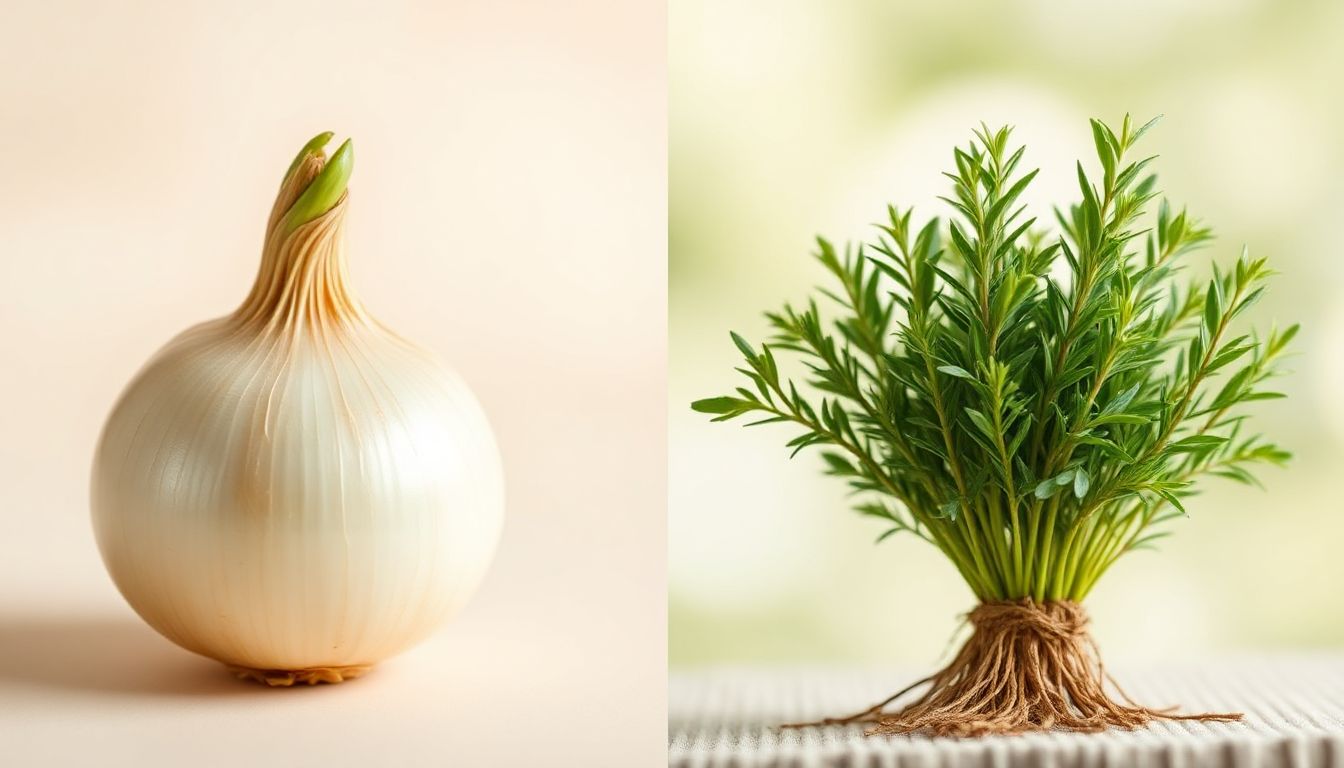
Onion shampoo vs herbal shampoo – which is better for hair growth
Everyone wants thicker, stronger hair that grows fast. It’s a common goal for many folks. When searching for hair growth solutions, two popular options often come up: onion shampoo and herbal shampoo. They both promise great results, but they use different ways to get there.
The big question hangs in the air: are the old benefits of onion for hair loss actually based in science? Or do the many natural items in herbal formulas give a wider, more effective path to hair growth? Deciding between them can feel tough.
This article will dig deep into the facts. We'll look at the science behind each type. You'll learn about their key ingredients, what good they might do, and any downsides. By the end, you'll know how to pick the best shampoo for your hair growth goals.
The Science Behind Onion Shampoo for Hair Growth
Onion shampoo has gained a lot of buzz lately. Many people use it, hoping to see their hair get longer and fuller. Its popularity stems from traditional beliefs and new research looking at its active parts.
Sulfur's Role in Hair Health
Onions are full of sulfur. This element is key to your hair's health. Sulfur acts as a building block for keratin, the main protein that makes up your hair. Having enough sulfur means your hair strands can be strong and healthy.
Sulfur also helps blood flow to your scalp. Better blood flow delivers more nutrients to hair follicles. On top of that, sulfur offers natural antibacterial traits. This can keep your scalp clean and free from issues that stop hair from growing well.
Clinical Evidence and Studies
Scientific studies on onion juice or onion-based shampoos for hair growth are still growing. Some small studies suggest it can help. For example, research showed that applying onion juice twice a day might help hair regrowth. Over eight weeks, some participants saw hair appear.
While more large-scale data is needed, existing research hints at sulfur's positive impact. One study noted a potential increase in hair thickness by up to 10% in some users. This suggests that the sulfur content could play a part in hair strength and growth.
Potential Benefits and Drawbacks
Onion shampoo offers several hoped-for benefits. It may help reduce hair fall. Many users find their hair strands feel stronger after regular use. It can also improve the general health of your scalp.
Yet, there are some downsides. The most common one is the smell. Onions have a strong scent that some people find hard to deal with. Also, for a few people, onion shampoo might cause scalp irritation. Always do a small test first.
Decoding Herbal Shampoos: A Holistic Approach to Hair Growth
Herbal shampoos take a different path. They use a mix of plants and natural extracts. The goal is to improve overall scalp health. This, in turn, helps hair grow better.
Herbal Ingredients and Their Functions
Herbal shampoos often have a variety of helpful ingredients. Each one plays a unique role.
- Biotin: This vitamin is vital for making keratin. It boosts hair strength.
- Rosemary: It may wake up hair follicles. Some say it helps blood flow to the scalp, which means more nutrients reach your hair.
- Peppermint: Like rosemary, peppermint can boost scalp circulation. It also provides a cool, tingly feeling.
- Aloe Vera: This plant is great for soothing and moisturizing the scalp. A healthy, calm scalp is key for hair growth.
- Amla (Indian Gooseberry): High in Vitamin C, amla has long been used to make hair stronger. It can help stop breakage.
- Bhringraj: This is an ancient Ayurvedic herb. It's often linked to preventing hair fall and promoting new hair growth.
The Synergistic Effect of Natural Blends
One big strength of herbal shampoos is their teamwork. Many herbal ingredients work better together than alone. This mix of plant extracts gives a full solution for hair and scalp issues.
This combination can address different problems at once. Some herbs fight dryness. Others help with oiliness or inflammation. This broad approach supports a healthy base for hair to grow from. It’s like giving your scalp a complete nutrient boost.
Research and Traditional Wisdom
Many individual herbal ingredients have scientific backing. For example, studies on rosemary oil showed it could be as good as some hair growth medicines. Other research has found that specific plant extracts, like those in bhringraj, can lengthen the hair growth phase by up to 15%.
Beyond modern science, these herbs have a long history. Cultures worldwide have used them for centuries in hair care. This traditional wisdom supports their use for strong, healthy hair. It shows they have a proven track record.
Comparing Efficacy: Onion vs. Herbal for Hair Growth
When you put onion and herbal shampoos side-by-side, their methods for hair growth differ. Both aim for the same result. But they get there in unique ways.
Mechanism of Action: Direct vs. Indirect
Onion shampoo often acts directly. Its main idea is that sulfur feeds the hair and helps with blood flow. This direct input aims to make hair shafts stronger and spur growth. It focuses on a specific chemical component.
Herbal shampoos take a broader, often indirect route. They work by improving overall scalp health. This means reducing irritation, feeding the scalp, and creating a better setting for hair to grow. They heal the environment where hair thrives.
Ingredient Purity and Potential for Irritation
Many onion shampoos on the market are mostly natural. However, some might include synthetic ingredients or added scents to hide the onion smell. This can be a concern for some users. It's wise to check the label closely.
Herbal shampoos are often seen as "more natural." But even natural ingredients can cause issues. Essential oils in herbal blends might trigger allergic skin reactions for some. Patch testing is always a smart step before using any new shampoo.
User Experiences and Testimonials
User stories give us a peek into real-world results. Many people who use onion shampoo report less hair fall. They say their hair feels stronger over time. Some share photos showing noticeable new growth.
For herbal shampoos, users often talk about a healthier scalp feeling. They report softer hair and less breakage. Many find that the natural scents are more pleasant. While not scientific proof, these shared experiences highlight potential benefits of both types.
Choosing the Right Shampoo for Your Hair Growth Journey
Picking the best shampoo means knowing what your hair needs. It's not a one-size-fits-all answer. Your personal hair concerns matter a lot.
Identifying Your Hair Concerns
Think about your hair beyond just growth. Do you have thinning hair? Does it break easily? Is your scalp dry, or does it get oily fast? Some onion shampoos might be better for hair fall. Certain herbal blends could soothe a dry scalp.
If hair fall is your main issue, the sulfur in onion shampoo might appeal to you. If you need overall scalp health and nourishment, a herbal blend could be a better fit. Consider if your hair feels weak or lacks shine.
Patch Testing and Ingredient Sensitivity
Always test any new shampoo on a small skin area first. This is super important for both onion and herbal types. Onion can be strong. Herbal shampoos with essential oils might cause a reaction. A simple patch test can save you discomfort.
Put a tiny bit of shampoo behind your ear or on your inner arm. Wait 24 hours to see if any redness or itching appears. This small step protects your scalp. It helps you avoid a full-blown bad reaction.
Complementary Hair Care Practices
Shampoo is only part of the story for great hair growth. For best results, add other healthy habits. Eat a balanced diet with lots of vitamins and minerals. Learn ways to manage stress, as it can affect hair health.
Be gentle when you handle your hair. Avoid harsh brushing or tight hairstyles. Consider a regular scalp massage to boost blood flow. You might also want to use deep conditioning treatments to keep your hair moist. These steps work with your shampoo for better hair.
Expert Opinions on Natural Hair Growth Solutions
What do the pros say about these natural hair helpers? Dermatologists and trichologists offer valuable insights. Their views help us understand the real science.
Dermatologist's Perspective on Sulfur and Hair
Dermatologists agree that sulfur is a key part of hair protein. They often say it can help improve hair's structure. However, they also caution that more large studies are needed to fully confirm onion shampoo's hair growth effects. It's not a magic cure.
Some experts suggest that sulfur's role in scalp health, like its anti-fungal traits, is more proven. A clean scalp is a great place for hair to grow. While some dermatologists note a potential for up to 5-7% more new hair in specific conditions, they stress that results vary greatly.
Trichologist Insights on Herbal Hair Growth
Trichologists, who study hair and scalp health, often support plant-based products. They point to the benefits of herbs like rosemary and peppermint for scalp circulation. They see ingredients like amla and bhringraj as good for hair strength.
Many experts believe these natural mixes can reduce inflammation. This helps to create a healthy base for hair. One trichologist mentioned that a well-chosen herbal blend could lessen hair shedding by up to 12% in some cases. They often recommend a holistic approach to hair care.
Conclusion
Both onion and herbal shampoos can help with hair growth. Onion shampoo focuses on sulfur's direct role in hair strength. Herbal shampoos offer a wider, natural approach to scalp health.
The "better" choice truly depends on you. Think about your hair type, scalp condition, and if you are sensitive to ingredients. What works well for one person might not be right for another.
Always put your scalp health first. Be consistent with whatever product you choose. Remember, a full approach to hair care—including diet and gentle handling—gives the best results. For personal advice, talk to a dermatologist or a trichologist. They can help you find your best path to healthy hair.
FAQs About Onion Shampoo vs. Herbal Shampoo
1. Which is better for hair growth: onion shampoo or herbal shampoo?
Both can help, but differently. Onion shampoo strengthens hair with sulfur, while herbal shampoo nourishes the scalp with natural ingredients like rosemary and biotin.
2. Does onion shampoo smell bad?
It can, but many brands now use deodorized onion extract or add mint/lavender to reduce the smell.
3. Can herbal shampoo treat dandruff?
Yes, ingredients like tea tree oil and aloe vera in herbal shampoos can help fight dandruff and soothe the scalp.
4. Is onion shampoo proven to regrow hair?
Some studies show onion juice may help, but results vary. It works for some but not all users.
5. Can I use onion shampoo daily?
Yes, but if you have a sensitive scalp, start with 2-3 times a week.
6. Which shampoo is better for thinning hair?
Onion shampoo may help weak hair, while herbal shampoo (with rosemary or biotin) improves overall scalp health.
7. Are herbal shampoos chemical-free?
Many are sulfate-free, but check labels—some still have mild preservatives.
8. Can onion shampoo cause initial hair fall?
Some users see temporary shedding as weak hairs shed before new growth appears.
9. Which is safer for colored hair?
Herbal shampoos (sulfate-free) are gentler on color-treated hair than onion shampoo.
10. How long until I see results?
Onion shampoo may show less hair fall in 4-6 weeks, while herbal shampoo improves scalp health gradually.


